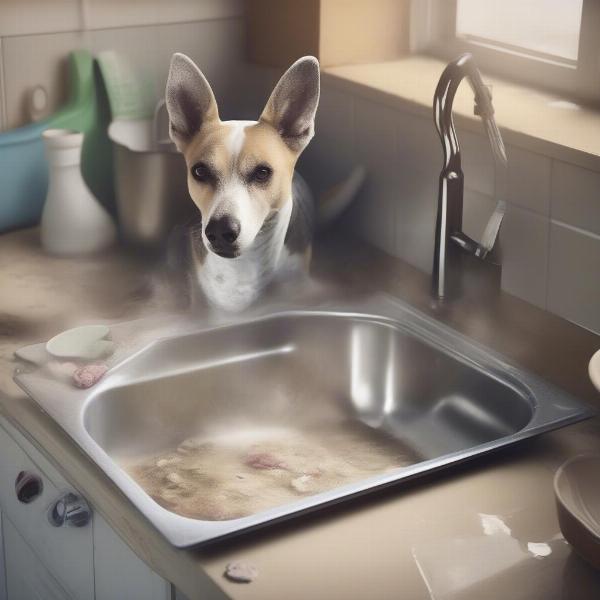Dishes smelling like wet dog is a frustratingly common problem that can make even the cleanest kitchen feel unpleasant. This pervasive odor can cling to everything from glasses and cutlery to plates and bowls, making mealtimes less enjoyable. Understanding the causes of this persistent smell is the first step towards eliminating it and enjoying fresh, clean dishes once again.
Unmasking the Culprit: Biofilm and Dog Saliva
The primary culprit behind the wet dog smell on dishes is often biofilm. This slimy layer is a community of bacteria and other microorganisms that thrive in moist environments, like your kitchen sink drain, garbage disposal, and even your dishwasher. Dog saliva, rich in proteins and enzymes, contributes significantly to biofilm formation. When dishes with residual saliva aren’t thoroughly cleaned, these organic materials become a feast for bacteria, leading to the development of that distinctive wet dog odor.  Wet dog smell emanating from dishes in the sink
Wet dog smell emanating from dishes in the sink
Furthermore, the dishwasher itself can become a breeding ground for biofilm if not regularly cleaned. Food particles, grease, and, yes, dog saliva, can accumulate in hard-to-reach places, creating the perfect environment for bacterial growth and the dreaded wet dog smell.
Tackling the Wet Dog Smell: Effective Cleaning Strategies
So, how do you banish this persistent odor? Here are some proven strategies:
- Pre-Rinse Thoroughly: Before loading the dishwasher, rinse all dishes, especially those that have come into contact with dog saliva, under hot water to remove as much food residue and saliva as possible.
- Use a High-Quality Dishwasher Detergent: Opt for a detergent specifically designed to combat grease and food particles. Consider adding a dishwasher cleaner regularly to eliminate biofilm buildup within the machine itself.
- Don’t Overload the Dishwasher: Overcrowding prevents water and detergent from reaching every surface, leading to incomplete cleaning and lingering odors.
- Clean Your Dishwasher Regularly: Remove and clean the filter, spray arms, and interior walls of the dishwasher with a solution of vinegar and water or a specialized dishwasher cleaner. This will help eliminate biofilm and prevent future odor problems.
- Air Dry When Possible: Allowing dishes to air dry can further reduce the chances of bacterial growth and lingering smells.
Beyond the Dishwasher: Other Sources of Wet Dog Smell
While the dishwasher is often the primary culprit, the wet dog smell can also originate from other sources in your kitchen:
- Kitchen Sink and Drain: The sink drain and garbage disposal can harbor bacteria that contribute to unpleasant odors. Regularly flush the drain with hot water and baking soda to neutralize odors.
- Dog Bowls: Just like your dishes, dog bowls need to be thoroughly cleaned regularly. Wash them with hot, soapy water or in the dishwasher to prevent bacterial growth and odor.
- Dish Towels and Sponges: These can become breeding grounds for bacteria if not washed and replaced frequently. Ensure you’re using clean dish towels and sponges to avoid transferring odors to your dishes.
Why does my dishwasher smell like wet dog even after cleaning?
Sometimes, even after a thorough cleaning, the wet dog smell persists. This could be due to a clogged drain hose or a problem with the dishwasher’s heating element, which can prevent proper drying and promote bacterial growth. In these cases, it’s best to consult a qualified appliance repair technician.
Preventing Future Odor Problems: Proactive Measures
The best way to deal with the wet dog smell is to prevent it in the first place. Here are some proactive measures:
- Hand Wash Dog Bowls Separately: Consider hand washing dog bowls separately from your other dishes to minimize the transfer of saliva and bacteria.
- Use a Dedicated Dog Bowl Sponge: Designate a separate sponge for cleaning dog bowls to avoid cross-contamination.
- Rinse Dishes Immediately After Use: Don’t let dirty dishes sit for extended periods, as this allows bacteria to multiply and odors to develop.
Conclusion
Dealing with dishes that smell like wet dog can be a frustrating experience, but by understanding the causes and implementing effective cleaning strategies, you can eliminate this persistent odor and enjoy fresh, clean dishes. Regular cleaning of your dishwasher, proper dishwashing practices, and addressing other potential sources of the smell are key to maintaining a clean and odor-free kitchen.
FAQ
-
How often should I clean my dishwasher? It’s recommended to clean your dishwasher at least once a month, or more frequently if you notice odors.
-
What’s the best way to clean my dog’s bowls? Wash dog bowls daily with hot, soapy water or in the dishwasher.
-
Can dog saliva damage my dishwasher? While dog saliva itself isn’t likely to damage your dishwasher, the bacteria it harbors can contribute to biofilm formation and unpleasant odors.
-
Why does my kitchen sink smell like wet dog? The sink drain and garbage disposal can trap food particles and bacteria, leading to a wet dog smell.
-
What if the wet dog smell persists after cleaning my dishwasher? A persistent odor could indicate a more serious problem, such as a clogged drain hose or a faulty heating element. Consult a qualified appliance repair technician.
You might also be interested in:
- [Link to relevant article on ILM Dog about dog hygiene]
- [Link to relevant article on ILM Dog about dishwasher maintenance]
ILM Dog is your trusted source for expert advice on all aspects of dog care, from breed selection and health to training, nutrition, and grooming. We provide practical and reliable information to help dog owners worldwide ensure the well-being of their furry companions. Whether you’re a seasoned dog owner or just starting out, ILM Dog has the resources you need. Contact us at [email protected] or +44 20-3965-8624.